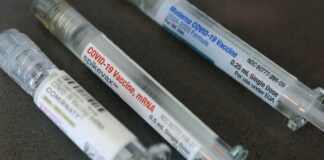New York and Minnesota among states prioritizing race in COVID treatment distribution.
Guidance issued by the Biden administration states certain individuals may be considered “high risk” and more quickly qualify for monoclonal antibodies and oral antivirals used to treat COVID-19 based on their “race or ethnicity.”
In a fact sheet issued for healthcare providers by the Food and Drug Administration, the federal agency approved emergency use authorizations of sotrovimab – a monoclonal antibody proven to be effective against the Omicron variant – only to patients considered “high risk.”
The guidance, updated in December 2021, says “medical conditions or factors” such as “race or ethnicity” have the potential to “place individual patients at high risk for progression to severe COVID-19,” adding that the “authorization of sotrovimab under the EUA is not limited to” other factors outlined by the agency.
Older age, obesity, pregnancy, chronic kidney disease, diabetes, and cardiovascular disease are among the multiple medical conditions and factors associated with what are considered “high risk” individuals by the FDA.
Some states, including New York and Utah, have made it clear they will prioritize certain racial minorities over other high–risk patients when it comes to the distribution of particular COVID treatments.
Last week, New York’s Department of Health released a document detailing its plan to distribute treatments such as monoclonal antibody treatment and antiviral pills.
The plan includes a section on eligibility for the scarce antiviral pills that people must meet to receive the treatment, including a line stating a person needs to have “a medical condition or other factors that increase their risk for severe illness.”
One such “risk factor” is being a race or ethnicity that is not White due to “longstanding systemic health and social inequities.”
“Non-white race or Hispanic/Latino ethnicity should be considered a risk factor, as longstanding systemic health and social inequities have contributed to an increased risk of severe illness and death from COVID-19,” the memo reads.
In guidelines issued by the state of Utah for the distribution of monoclonal antibodies in the state, residents who are “non-white race or Hispanic/Latinx ethnicity” receive 2 additional points when calculating their “COVID-19 risk score.”
“Race/ethnicity continues to be a risk factor for severe COVID-19 disease, and the Utah COVID Risk Score is one approach to address equitable access to hard hit communities,” the Utah guidance stated, adding a reminder that national guidance from the FDA “specifically states that race and ethnicity may be considered when identifying patients most likely to benefit from this lifesaving treatment.”
Similarly, the framework issued by the state of Minnesota advises clinicians and health systems to “consider heightened risk of progression to severe COVID-19 associated with race and ethnicity when determining eligibility” for the allocation for monoclonal antibody therapies.
“FDA’s acknowledgment means that race and ethnicity alone, apart from other underlying health conditions, may be considered in determining eligibility for mAbs,” the framework states. “It is ethically appropriate to consider race and ethnicity in mAb eligibility decisions when data show elevated risk of poor COVID-19 outcomes for Black, Indigenous and other people of color (BIPOC populations), and that this risk cannot be adequately addressed by determining eligibility based on underlying health conditions (perhaps due to underdiagnosis of health conditions that elevate risk of poor COVID-19 outcomes in these populations).”





